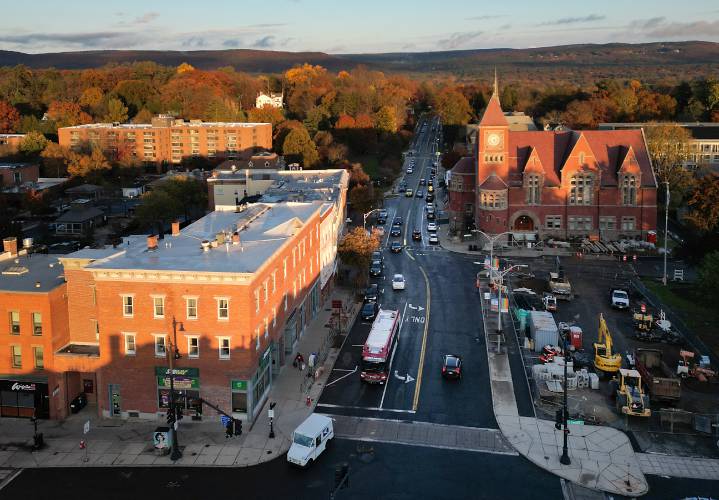
Downtown Amherst looking down Main Street toward the Town Hall building.
GAZETTE FILE PHOTO
AMHERST — Following a two-week delay prompted by worries about the process for how it would bring recommendations to the Town Council, the Amherst Black Reparations Committee could get its charge and be officially created on Monday.
Under the proposal reviewed by the council’s Governance, Organization and Legislation Committee, the new committee would accept proposals, review them and then make recommendations to the council, in that order, said District 5 Councilor Ana Devlin Gauthier, who chairs the council committee.
But the idea of having the five-member committee to regularly consult with the Black community in Amherst was put off by At Large Councilor Mandi Jo Hanneke, who said she is nervous that the council’s only role would be to fund recommendations and that the new committee should have a broader charge than disbursing up to $100,000 annually to address harms perpetrated against residents of African heritage.
When an attempt was made to refer the charge of the new committee back to the council committee failed, Hanneke used her prerogative to postpone a decision until the next meeting.
Devlin Gauthier said the reparations committee establishes the priority level on funding matters, because the council isn’t the expert, in part because so few members have the necessary lived experience
“That priority level is coupled with feasibility in order to get something reasonable presented to the council,” Devlin Gauthier said.
The council’s role is to approve or reject funding requests, Devlin Gauthier said.
The reparations committee, though, won’t be able to give money directly to individuals without state legislation, but could support creation of a Black, Indigenous and people of color-led youth center with programming that addresses the needs of young people of African descent, provide more affordable housing and homeownership opportunities, and establish a municipal program to teach entrepreneurship skills. Those were all recommendations in a final report delivered a year ago by the African Heritage Reparations Assembly.
Hanneke said she is uncomfortable with aspects of the charge.
“Reparations as a word and as a concept, to me, is not specific enough that all priorities be delegated to a committee instead of an elected body,” Hanneke said, adding that the committee is too far away from the residents of the town.
“When are we going to fix our policies, bylaws and regulations to remove structural racism from them, this seems like the committee that we should charge with looking at the bylaws, regulations and policies and seeing if anything in there is structurally racist or ends up with racist outcomes and then make recommendations,” Hanneke said.
District 2 Councilor Pat De Angelis said members of the Community Preservation Act Committee are also unelected and make funding recommendations. “How is this different?” De Angelis said.
District 3 Councilor Heather Hala Lord said the money decisions have to be come from the committee. “It really does need to lie in the hands of the Black community who has been historically harmed and continues to combat structural racism on a day-to-day basis,” Lord said.
At Large Councilor Ellisha Walker said the reparations committee will rely on experts in repair, while the councilors control the purse strings.
“This really calls for a unique structure, but it still sits within the bounds of what we have allowed for other committees,” Walker said.
Scott Merzbach can be reached at smerzbach@gazettenet.com.
More News for you
By using this site, you agree with our use of cookies to personalize your experience, measure ads and monitor how our site works to improve it for our users
Copyright © 2016 to 2024 by H.S. Gere & Sons, Inc. All rights reserved.



